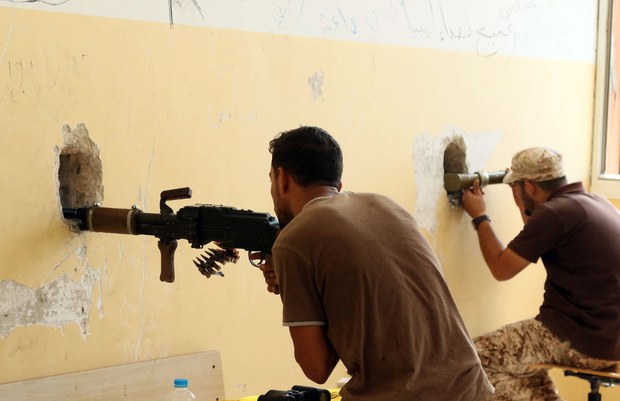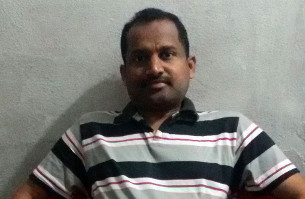‘Lucky to be Alive,’ Says Indian Freed as IS Hostage in Libya
2016.09.28
New Delhi
 Members of forces loyal to Libya’s U.N.-backed Government of National Accord (GNA) guard a lookout point in the coastal city of Sirte during a military operation to clear the area of Islamic State militants, Sept. 19, 2016.
Members of forces loyal to Libya’s U.N.-backed Government of National Accord (GNA) guard a lookout point in the coastal city of Sirte during a military operation to clear the area of Islamic State militants, Sept. 19, 2016.
Indian academic T. Gopikrishna says the bad dreams about his 414-day ordeal as a hostage still haunt him after his rescue from Islamic State (IS) captivity in Libya earlier this month.
“It was a very difficult period. I never thought I would be able to see my family again. And though I am fully aware I am now safe at home, I still have trouble sleeping soundly. The nightmares of my time in captivity jolt me awake almost every night,” Gopikrishna told BenarNews in a phone interview from his home city of Hyderabad in southern India, where he returned on Sept. 24.
A former computer science and engineering professor at Sirte University in Libya, he and his Indian colleague C. Balaramkishan, an English professor at the campus, were kidnapped by suspected IS militants on July 29, 2015, while traveling to Tripoli airport to catch a flight home from their annual vacation.
The Libyan army rescued the pair in a military operation on Sept. 14, the details of which were not made public.
The two men were among four Indians abducted together by IS militants. The two other hostages, Laxmikant Ramakrishna and Vijay Kumar, fellow colleagues at the university in Sirte, were released after two days in captivity.
Recalling the day of their abduction, Gopikrishna said he and Balaramkishan were chatting about their respective families and their holiday plans, when masked men with guns stopped their cab about 50 km (31 miles) from Sirte.
“The men spoke to our driver for a few minutes, after which the driver left the vehicle. And before we could even understand what was happening, our faces were covered with sacks. Both of us were pleading to be let off. But we were told to stay quiet,” he said.

T. Gopikrishna is shown at his home in Hyderabad, India, Sept. 28, 2016. [Courtesy of T. Gopikrishna]
14 months in a ‘pigeonhole’
The professors were shoved in the back of a car and driven a short distance away – “not more than a 20-minute drive or may be a bit longer,” said Gopikrishna, adding they were then offloaded and pushed into a small, dingy room, where the sacks over the heads were removed.
“There was no light in the room, but for the bit coming through from a tiny opening high up on one of the walls. There was almost zero ventilation. There were two mattresses on the floor. I thought I’d suffocate before they could kill me,” he said.
Little did the professors know that the “pigeonhole” would become their home for the next 14 months.
“For days on end we wouldn’t see our abductors. Twice a day someone would slip in our food – most of time it was bread and vegetables. We were never physically tortured, but not knowing who had kidnapped us or why, or what was going to be our fate was enough of a mental torture,” Gopikrishna said.
“We had nothing to do aside from eating and sleeping. But Balaramkishan and I would chat about our families and how we might never see them again. We would cry together and sometimes laugh at jokes we told each other to keep our sanity,” he said.
‘We thought this was it’
During their captivity, the two hostages often heard gunshots, Gopikrishna recalled.
“At times we hoped that the army was around to rescue us, and at other times that we’d be killed so that at least the endless wait would be over,” he added.
Then one day, after another round of gunshots, the professors heard banging on the door to their room.
“We thought this was it. They’re going to kill us. But when the door opened it was the army. They said they were there to rescue us. We didn’t know how to react. We could not believe it,” Gopikrishna said.
Back home with his family in Hyderabad, Gopikrishna said he regretted moving to Libya in 2007 for the extra money he was offered.
“I am just very lucky to be alive and back home. I can’t thank the Libyan army and the Indian government enough for giving me a second go at life,” he said.
His wife, Kalyani, told BenarNews that she wouldn’t let him leave again even if he wanted to.
“I have waited for so long [for his return]. [I am] very happy he is back, and can’t express my joy in words. I won’t let him go again,” she said.
All efforts to contact Balaramkishan, also from Hyderabad, failed. His wife, Sridevi, told BenarNews that he was not interested in talking to the press.
“Our entire family is overjoyed he is back safe. For 14 months we were living in tension, surviving solely on the hope that he will one day return home,” she said.
More captives
According to India’s Ministry of External Affairs, while the government had facilitated the return of about 700 Indians back home from Libya, about 800 Indians are employed in different parts of Libya, which is one of the strongholds of IS.
Ministry spokesman Y.S. Kataria did not rule out the possibility of more Indians being held captive by suspected IS members in Libya.
“We know 39 [Indian] people are in [IS] captivity in Iraq. The number of captives in Libya is still being assessed through our consulate there,” he told BenarNews.
“All diplomatic channels are being adopted for their safe release. The embassy officials are in constant touch with the respective authorities, and where there is no government, with whoever is in control of the area,” he said.







